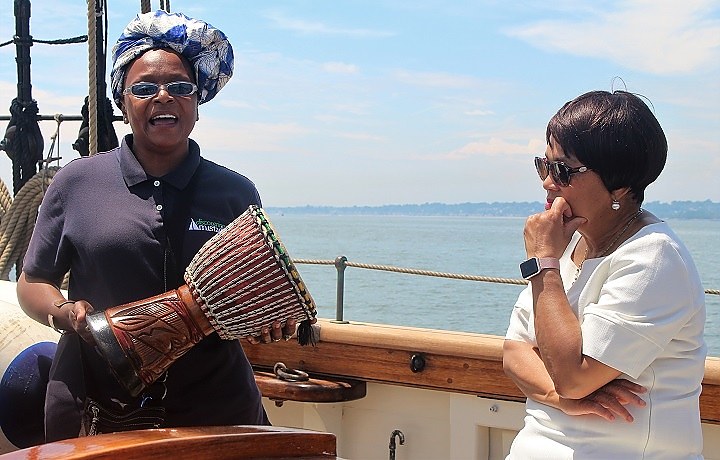MEDIA center: Article
The Amistad Sails Again
New Haven Independent | July 3, 2019
By Thomas Breen
Mayor Toni Harp on board the Amistad (Thomas Breen Photo)
One hundred and eighty years after enslaved Africans revolted for their freedom off the coast of Cuba and made history, local African American elected officials set sail aboard a replica of that same ship off the coast of Long Wharf.
The ship docked at Long Wharf
On Wednesday afternoon, Mayor Toni Harp joined Amity/Westville Alder Richard Furlow, Bella Vista Alder Renee Heywood, and Dwight Alder Frank Douglass for a 90-minute ride through the Long Island Sound on the Freedom Schooner Amistad.
The ship, currently docked at its home port of Long Wharf Pier at 389 Long Wharf Dr., is a recreation of the Spanish schooner La Amistad. On July 2, 1839, 53 Mende captives aboard La Amistad rose up against their Spanish captors while being ferried between Havana and Puerto Principe, Cuba to be sold into slavery.
Discovering Amistad crewmen prepare the ship for Wednesday’s ride
Led by Sengbe Pieh, the group took control of the ship, which was soon recaptured by the U.S. Navy off the coast of Long Island. The Amistad revolutionaries were later taken to Connecticut and imprisoned in New Haven, where they and a coalition of local, state, and national abolitionists fought years of legal battles to restore their freedom. In 1841, the U.S. Supreme Court ruled in favor of the Mende, whose heroic resistance aboard La Amistad represents one of the great, successful revolts in the history of the international slave trade.
“This was a moment of success,” Discovering Amistad educator Adwoa Bandele-Asante said aboard the ship Wednesday afternoon. The uprising was a popular rebellion led by Africans in opposition to slavery; by people taken in chains from their home country, held in squalid conditions below deck with the promise of great further hardship ahead; and who seized their freedom, first through physical rebellion, and then through the courts. “What is important to me is depicting Africans standing up for themselves,” she said.
Discovering Amistad educator Bandele-Asante
The Freedom Schooner Amistad, a 78-foot Baltimore Clipper first launched in 2000, is run by Discovering Amistad, an educational nonprofit founded in November 2015 with the goal of teaching about the Amistad revolt through classroom presentations and rides aboard the ship. The ship will be open for tours and ticketed rides from Long Wharf through July 8. Click here for a full schedule of ticketed events.
Discovering Amistad educator Bandele-Asante and Harp
While coasting along the Sound in the direction of Lighthouse Point Park, Harp recalled that she did not first get to know the story of the Amistad until well into adulthood, after she earned her master’s degree from the Yale School of Architecture in 1978 and then joined the Board of Alders several years later.
“I was really shocked I hadn’t learned about it earlier,” she said.
She remembered getting calls at the time from Amistad Committee President Al Marder, seeking her and her colleagues’ support for the construction of a statue honoring Sengbe Pieh, also known as Joseph Cinqué, outside of City Hall. As Marder pushed the importance of all New Haveners knowing the story of the Amistad captives and their revolt, Harp dove into the history and fought for the memorial, which was dedicated in 1992.
What resonates most with her today about the story, she said, is the way that a diverse group of abolitionists, clergymen, Yale students and teachers, city residents, and the African men themselves came together to fight for the Mende people’s freedom. Those allies believed in recognizing human beings as human beings, and not as cargo, she said. They overcame superficial differences and recognized a common humanity. “We’re still fighting that fight today.”
Dwight Alder Frank Douglass and Discovering Amistad board chair Len Miller
Douglass, who grew up in the old Elm Haven projects in Dixwell, said he first learned the story of the Amistad rebellion while a middle school student at the old Winchester School back in the 1960s. “It was an amazing story,” he said. He remembered being taught the Amistad story by black teachers, and feeling pride that here, in his very city, a group of black men fought and won their freedom in the midst of such a horrific history of slavery. “It actually happened here,” he said, “in New Haven.”
Westville/Amity Alder Richard Furlow
Furlow, whose family has been in New Haven for over a century, said he remembered learning about the Amistad history when he and his friends were rushing home from school to watch the miniseries Roots. Later in life, one of his close friends from New Haven got a minor role in Steven Spielberg’s big screen adaptation of the Amistad story. “The main thing is always about equality,” he said. “Equality of race, of finances.” Even these 180 years later, he said, students of history should look to the Amistad for a foundational lesson in the equality of all human beings.
Bandele-Asante and Bella Vista Alder Renee Haywood
And Heywood, on ship with her young granddaughter Djenesha Crenshaw, said she didn’t learn about the Amistad until she returned from New York City to New Haven around two decades ago.
“This wasn’t taught anywhere in history when I was in high school,” she said.
A view of Lighthouse Point Park from the Amistad
Source: https://www.newhavenindependent.org/index.php/archives/entry/amistad/










